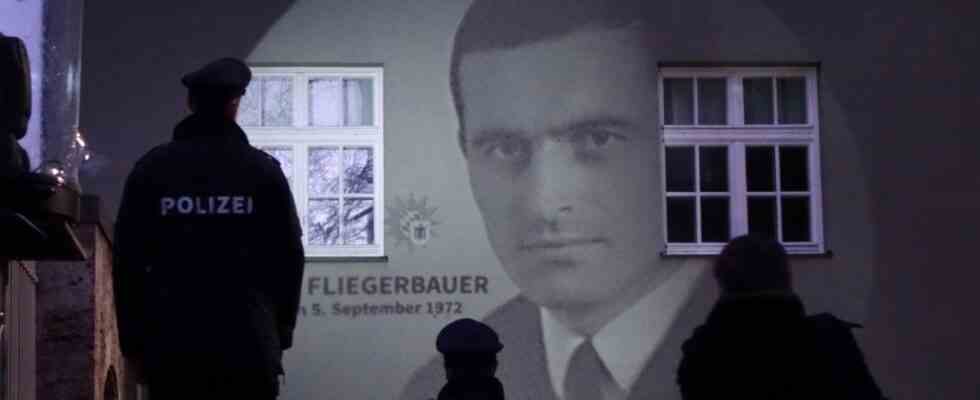It’s not a monument to Moshe Weinberg that stands there on the first floor of the Jewish Museum, at least not a classic one. But it is a moving place of remembrance for the Israeli wrestling coach who became the first victim of the Palestinian terrorists on September 5, 1972: a cartoon drawing of the Olympic Stadium on the wall, in front of it only three stools and some copies of Nina Prader’s graphic novel “The Wrestlers”, which you can immerse yourself in here in complete peace.
Artist Prader says she didn’t want to reproduce the well-known images of the Olympic assassination, “no helicopters and masked men.” And it was also important to her not to focus on Weinberg’s death, but on his life. In her research, Prader spoke extensively to Mimi and Guri Weinberg, Moshe’s widow and son, who was one month old when his father died. In this way, the readers of the graphic novel get closer to the man Weinberg and learn, for example, that he would prefer not to be called Moshe, but Muni.
The “Twelve Months – Twelve Names” memorial project, which quickly became a centerpiece of Munich’s 2022 commemorative year, ends with Nina Prader’s drawn memorial for Muni Weinberg. Every month, an installation or exhibition, a school campaign or a sporting event is dedicated to a different victim of the Olympic attack, and at different locations in Munich and Fürstenfeldbruck. Supported by the NS Documentation Center and the Israeli Consulate General, the Jewish Museum brought numerous cooperation partners on board. On Friday, the organizers took stock – of their project, but also critical of Munich’s efforts to remember with dignity.
A documentary volume of the project has just been published
“Our job is to keep the memory alive of every single person who lost their life back then,” said Mayor Katrin Habenschaden (Greens) on the podium in the foyer of the Jewish Museum. That’s exactly what the “Twelve Months – Twelve Names” series did in an exemplary manner. Israeli Consul General Carmela Shamir read the names of the twelve murdered on stage and said: “For many years, death gave them their names. Now it is their love.” The documentary volume of the project, which has just been published by the Leipzig publishing house Hentrich & Hentrich, is likely to be the first of the many publications on the Olympic assassination that focuses exclusively on the victims. Editor Angela Libal has also compiled numerous touching photos from the private collection of the bereaved.
Bernhard Purin, the director of the Jewish Museum, considers the year 2022 to be a turning point: “After fifty years, we have now succeeded in making the Olympic assassination part of the city of Munich’s collective memory.” Purin did not hide the fact that he found the path to this goal unnecessarily difficult. At the very first press conference on the Olympic anniversary with city representatives in May 2021, the assassination “was not even mentioned in the statements or in the press documents”. For him and others, this omission was the impetus for their own memorial project.
Purin also indicated that it took an open letter from the Israeli Consul General to sensitize some city officials to the importance of the commemoration. Many in the audience took his gratitude for the support of habenschaden, which was not always a matter of course in the city, as a tip against mayor Dieter Reiter (SPD). On the other hand, Anna Ulrike Bergheim, chairwoman of the Fürstenfeldbruck Historical Association, received praise from all sides: the victims of the attack have been remembered there for much longer and more intensively than in Munich. According to Bergheim, Brucker Land was also involved six times in “Twelve Months – Twelve Names”.
An exhibition in the Fürstenfeldbruck district office commemorated the Israeli wrestler Eliezer Halfin.
(Photo: Carmen Voxbrunner)
“Remembrance is not a burden, but an opportunity,” said Christian Springer as the last speaker. The cabaret artist had supported, among other things, a meeting of young fencers from Israel and Germany with his initiative “Shutting up in ranks” in memory of the murdered fencing coach Andrei Spitzer. Springer criticized the German way of dealing with the Israeli survivors. The fact that there was still no agreement on compensation a few days before the central commemoration ceremony in Fürstenfeldbruck at the beginning of September was “a great shame”. He has never been so “ashamed of my country as this year”.
The podium participants were unanimous in their conviction that the work of remembrance should not simply end after the 2022 commemorative year. And sometimes, according to Springer, there must be consequences. He announced a push to rename Brundage Square in the Olympic Park to bear the name of American Avery Brundage, who was President of the International Olympic Committee (IOC) in 1972. “Bundageplatz has to go,” said Springer. Brundage was an anti-Semite and had “paid homage to Hitler as early as 1936 at the Berlin Games”.
This has already had consequences in the USA. In fact, the Asian Art Museum in San Francisco, home to Brundage’s personal art collection, removed the bronze bust of his donor from the foyer in July 2020. Brundage’s anti-Semitic and racist statements were well documented, the museum said at the time. Christian Springer has now opened the Munich debate.

